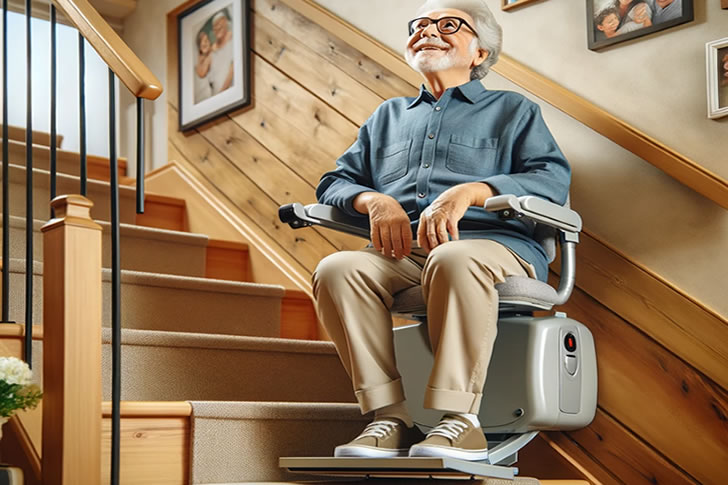Navigating stairs can become increasingly challenging for the elderly. This guide provides advice on selecting a stair lift and exploring Medicare coverage to ease daily living.

Understanding Stair Lifts
A stair lift is a mechanical device designed to transport individuals up and down stairs, providing a safe and convenient solution for those with mobility challenges. This equipment is particularly beneficial for elderly individuals who may face issues such as arthritis, balance problems, or limited strength.
Benefits of a Stair Lift for the Elderly
- Minimizing the Risk of Falls and Injuries: Stair lifts significantly reduce the likelihood of accidents that can occur when navigating stairs, which is a common hazard for seniors.
- Allowing Seniors to Navigate Their Homes Without Assistance: With a stair lift, elderly individuals can maintain their independence by moving freely between different levels of their homes without needing help from others.
- Enabling Access to Multi-Level Spaces Without Strain: Stair lifts make it possible for seniors to access all areas of their homes, including bedrooms, bathrooms, and living spaces, without exerting themselves physically.
Types of Stair Lifts
Understanding the different types of stair lifts can help in making an informed decision:
- Straight Stair Lifts: Ideal for straight, uncomplicated staircases, these are the most common and typically the most affordable option.
- Curved Stair Lifts: Custom-built for curved or spiral staircases, these lifts are tailored to fit the specific shape of the stairs.
- Outdoor Stair Lifts: Designed to withstand various weather conditions, these are suitable for exterior stairs, allowing access to outdoor areas.
- Standing Stair Lifts: Adapted for users who have difficulty sitting or rising from a seated position, these lifts allow individuals to stand while being transported up and down the stairs.
How Medicare Influences Stair Lift Decisions
Does Medicare Cover Stair Lifts?
Medicare is a federal health insurance program commonly used by U.S. seniors. However, it is essential to understand how Medicare handles stair lifts:
- Original Medicare Coverage: This part typically covers some durable medical equipment (DME), but unfortunately, stair lifts do not fall under this category.
- Medicare Advantage Plans: Some Medicare Advantage plans may offer additional benefits, including coverage for home modifications such as stair lifts. It is crucial to check with your plan provider to determine what options are available.
Steps to Secure Financial Assistance
Although Original Medicare does not cover stair lifts, there are alternative ways to manage the costs:
- Investigate Medicare Advantage Plans: Check whether your Medicare Advantage plan offers benefits that cover stair lifts.
- State Medicaid Programs: Some state Medicaid programs provide assistance for home modifications, which may include stair lifts.
- Veterans’ Programs: Eligible veterans can inquire about specific programs that may cover stair lifts.
- Non-Profit Organizations: Various non-profits assist seniors with mobility issues and may offer financial support or resources.
- Loans, Grants, or Payment Plans: Look into financing options that make purchasing a stair lift more affordable.
Tips for Selecting a Stair Lift
Tailoring to Personal Needs
When choosing a stair lift, consider the following to ensure it meets individual needs:
- Mobility Level: Determine the user’s current mobility level and potential future changes to ensure the stair lift remains suitable over time.
- Staircase Type: Identify whether you have a straight, curved, narrow, or wide staircase to ensure proper fit and functionality.
- Weight Capacity: Ensure the stair lift can accommodate the user’s weight comfortably and safely.
- Comfort Features: Look for cushioned seats, adjustable seat heights, and footrest options to enhance comfort.
- Control Accessibility: Controls should be straightforward and within easy reach for the user.
Professional Installation and Maintenance
Proper installation and routine maintenance are crucial for safety and functionality:
- Professional Assessment: A professional assessment ensures compatibility with your staircase and safety for the user.
- Certified Technicians: Only certified technicians should install the stair lift to ensure it meets safety standards.
- Yearly Inspections: Regular inspections help keep the stair lift functioning efficiently and safely.
Enhancing Stair Lift Safety for the Elderly
Consider the following aspects to enhance safety:
- Reliable Seatbelt: Ensure the stair lift is equipped with a secure seatbelt to keep the user safe during transport.
- Emergency Stop Buttons: The stair lift should have easily accessible emergency stop buttons for immediate use if needed.
- Power Outage Operation: Ensure the stair lift can operate during power outages, providing continued access.
- Obstacle Detection: The lift should have a mechanism to prevent movement if an obstacle is detected on the stairs.
Conclusion
Navigating staircases can become increasingly challenging for the elderly, but a stair lift can significantly improve safety and independence. Understanding the options available, assessing personal needs, and seeking financial assistance through Medicare or other resources ensures a well-informed and sustainable decision. With thoughtful considerations and regular maintenance, a stair lift can be a valuable addition to an elder’s home, promoting a safer and more comfortable living environment.
By understanding the types of stair lifts, the intricacies of Medicare coverage, and the key factors in choosing the right stair lift, you can make an informed decision that supports the health and well-being of your elderly loved ones.









